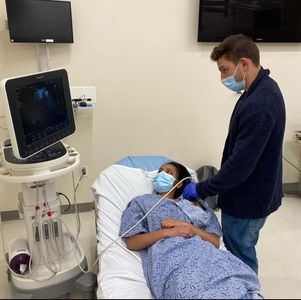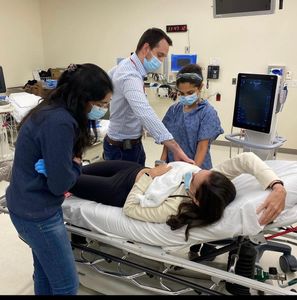The Internal Medicine Residency Program at BUMC offers residents specialized tracks, known as pathways, that provide individualized additional training in areas of expertise and distinction. Enrollment in pathways is open to residents in the fall of PGY2.
Health Equity Across Populations Pathway
Though health equity is embedded throughout the general residency curriculum, residents have the opportunity to deepen their knowledge and experience through participating in the Health Equity Across Populations Pathway. This pathway prepares residents to work as agents of change in their field of choice, equipped with a robust understanding of health equity and its application in clinical practice, research, leadership, and advocacy in diverse local and global contexts.
Residents craft their own learning goals and work with pathway leadership and mentors to work towards meeting them over the subsequent two years through didactic sessions, clinical exposures, and work on a scholarly project. We aim to network participants to projects, faculty, and organizations that will provide venues for high quality experiences pertinent to health equity during residency and across their careers. Through exposure to diverse faculty at BMC, in Boston, and globally, residents explore the range of what a career in health equity can look like and find potential mentors. The pathway builds upon the foundation set during intensive weeks at the start of the pathway with evening sessions throughout the two years and an additional immersion week. To gain real-world exposure and apply what they’ve learned in clinical practice, residents engage in clinical experiences which can include an additional outpatient clinic, equity-focused electives, and/or global health rotations. All pathway residents are asked to complete a scholarly project during the pathway to help build their skillsets as a change-maker. This can take the form of a research project, educational session, advocacy or activism work, quality improvement or program development, or other form as aligned with resident goals. Throughout the pathway, residents form a learning community and engage in guided self-reflection to build critical consciousness of their positionality and how it affects their work.
Medical Educator Pathway
The Medical Educator Pathway is designed for residents interested in becoming clinician educators. The curriculum is aimed at developing resident skills related to giving effective educational presentations and teaching clinical reasoning, while simultaneously guiding residents towards implementing educational initiatives on campus and producing scholarly work.
The pathway is directed by Dr. Robert C Lowe, an award winning medical educator. Dr. Lowe uses the literature on medical education and learning theory to guide practical discussions and workshops for the residents. He also selects other dedicated faculty who provide expertise in areas such as mentoring, providing feedback, and highlighting career paths for clinician educators to speak with the residents throughout the year.
Opportunities available to residents include teaching medical students in classroom settings and on the wards, developing curriculum used by the residency program, and being observed while presenting clinical cases followed by receiving feedback.
Previous Med Ed Projects
- Development of the Boston Medical Center Resident Initiated Guide to Discussing Goals and Expectations (BRIDGE) document, a guideline to help residents properly orient interns and medical students at the beginning of an inpatient rotation, with a focus on effective communication and regular feedback.
- Drafting the Second Year Medical Student Cardiology Class Syllabus, which previously used only a commercial textbook.
- Developing a pilot program on mentoring MD/PhD Students prior to the transition from their research years to the beginning of their clinical rotations.
HIV Pathway
The HIV Pathway trains physicians in cutting-edge longitudinal care of patients with HIV. Caring for patients at the Center for Infectious Diseases at BMC is a unique opportunity to specialize in team-based HIV medicine as a resident. Boston Medical Center has one of the largest and most diverse HIV clinics in the Boston area. Of over 1,450 HIV-infected individuals in 2012:
- 60% were black or African American
- 20% were Latino
- 37% were women
- 43% were foreign-born
Physicians trained in general medicine, infectious diseases, and other subspecialties continue to be vital to the care of patients with HIV; therefore, participants in the HIV pathway will also have a variety of career paths.
Residents will develop expertise in management of HIV including anti-retrovirals and HIV-associated co-morbidities and will also become adept at caring for patients in a team which includes care management, social work, addiction treatment, peer advocates, nursing, pharmacy, and mental health providers.
Framingham Heart Study Pathway
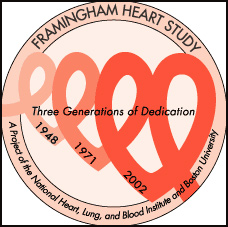 The Framingham Heart Study is a long term cohort study, currently in it’s third generation, investigating risk factors for cardiovascular disease among the population of Framingham, Massachusetts. The FHS partners with the BU School of Medicine and School of Public Health under the leadership of pathway director and BU Associate Professor of Medicine, Dr. Vanessa Xanthakis.
The Framingham Heart Study is a long term cohort study, currently in it’s third generation, investigating risk factors for cardiovascular disease among the population of Framingham, Massachusetts. The FHS partners with the BU School of Medicine and School of Public Health under the leadership of pathway director and BU Associate Professor of Medicine, Dr. Vanessa Xanthakis.
The FHS Pathway offers residents training in clinical epidemiology and provides opportunities for mentored research with established FHS investigators. The pathway is designed for residents who are committed to a career in translational or clinical investigation. Pathway activities involve formal didactics (on research design and methods, introduction to biostatistics, and introduction to cardiovascular epidemiology), mentored original research, “hands-on” engagement in FHS research center activities, and structured career and peer mentorship.
Quality Improvement & Patient Safety (QIPS) Pathway
The Quality Improvement & Patient Safety (QIPS) Pathway is designed for those seeking leadership in improving our healthcare system. All internal medicine residents at Boston Medical Center participate in quality improvement projects in their second year. The project teams are usually headed by members of the QI Pathway. Many lead further projects in their senior year targeted towards their particular interests. Residents who are selected for the QIPS Pathway are those that want to take improvement further and truly make it a part of their career in medicine. The QIPS Pathway is designed to create the future leaders of medicine. It focuses on promoting the knowledge, teamwork, and teaching skills necessary to take on a leadership role in improving systems of care, both locally and abroad.
While in the pathway, residents become deeply involved in the operations of our medical center to promote exceptional care for our patients including the following:
- Joining various operations committees
- Working directly with the executive leadership and board of trustees
- Collaborating with the Massachusetts Medical Society and in the Massachusetts Chapter of the American College of Physicians Council of Residents.
- Serving in numerous roles in concert with the Institute for Healthcare Improvement (IHI), such as co-chairing the National Forum for Quality Improvement in Health Care
- Attending the Academy for Emerging Leaders in Patient Safety (formerly the Telluride Patient Safety Round Table) and being chosen as ACMQ National Quality Scholars and Lown Right Care Educators.
QI Projects
Residents frequently obtain funding for improvement projects. A $25,000 grant was recently awarded to a QIPS resident to improve transitions of care. Boston Medical Center is a leading hospital in supporting its residents in Quality Improvement both with financial resources and by encouraging and welcoming resident attendance at meetings with top hospital executives.
Recent Projects in the Pathway Include:
- Efforts to improve hand hygiene in the intensive care unit
- Smoking cessation in high risk patients
- Optimizing medication reconciliation
- Increasing adverse event reporting
QIPS Core Competencies
- IHI self-study certificate
- Completion of the ACP/APDIM Cost Conscious Care Curriculum
- Experience with the Boston Medical Center QIPS office including involvement in Root Cause analysis meetings, medical-legal meetings, and multi-disciplinary (RNs, IT, administration) project implementations
- Involvement in at least one QIPS and/or IT Committee at BMC
- Development and implementation of a QIPS project either by the individual or in conjunction with other members in the pathway
- VA Patient safety elective (At least 1 elective block)
- Mentoring with QIPS experts in the Department of Medicine, VA, and at BMC level
Clinical Informatics Pathway
The Clinical Informatics Pathway provides advanced opportunities for trainees to develop knowledge of health information systems’ role within healthcare.
Why informatics?
Clinical informatics is defined as “analyzing, designing, developing, implementing, and evaluating information and communication systems that enhance individual and population health outcomes, improve patient care, and strengthen the clinician-patient relationship.” 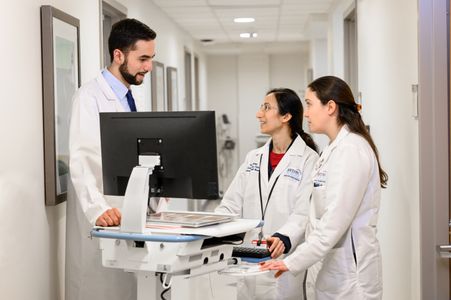 As information science and electronic applications become critical pillars in clinical medicine, it is essential to train and develop physician leaders with advanced skills, knowledge, and experience in the field of clinical informatics. Physicians with expertise in clinical informatics can collaborate with information technology non-clinicians to improve patient care, reduce healthcare waste, and improve the clinician and patient experience with electronic health systems and other electronic applications/devices that interact with health care.
As information science and electronic applications become critical pillars in clinical medicine, it is essential to train and develop physician leaders with advanced skills, knowledge, and experience in the field of clinical informatics. Physicians with expertise in clinical informatics can collaborate with information technology non-clinicians to improve patient care, reduce healthcare waste, and improve the clinician and patient experience with electronic health systems and other electronic applications/devices that interact with health care.
Increasing the pool of physicians with clinical informatics expertise are priorities for health care systems at the local and national level. There are ACGME accredited Clinical Informatics fellowships and a Board Exam (out of ABPM) that can be pursued on a career journey in clinical informatics. Clinical informaticists go on to roles that vary widely, including academic medicine, software development, data analytics, and hospital administration.
The Clinical Informatics Pathway
The Pathway will provide for educational experiences in academic and pragmatic clinical informatics. This includes gaining skills, knowledge, and attitudes related to understanding the interplay between health care delivery and IT systems, electronic health records, electronic clinical decision support, data analytics and inter-professional collaboration between physicians and health IT analysts. Trainees will develop skills and knowledge via experiential learning and academic inquiry, including but not limited to the following:
- Involvement in hospital operations and clinical IT planning, implementation, and maintenance activities.
- Exposure to data analysis, implementation science, and operational strategy.
- Opportunities to advance peer education in EHR and informatics skills.
- Participation in physician-focused advanced EHR training with the option for more technical access to EHR build.
- Mentorship by informatics leadership.
- Exposure to the intersection of quality improvement and informatics through co-participation in educational and scholarly activities of the Quality Improvement and Patient Safety pathway, with the potential for collaboration on quality improvement projects.
Pathway Goals:
- To expose residents interested in addressing systems-issues through the use of information technology to the field of clinical informatics.
- To cultivate an interest in and understanding of clinical informatics through hands-on and didactic opportunities to experience the many facets of clinical informatics.
- To prepare residents for application to Fellowship in Clinical Informatics should they so desire.
Point of Care Ultrasound (POCUS) Pathway
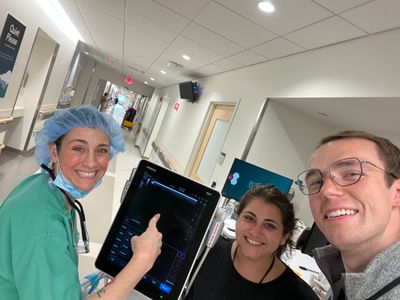
The point of care ultrasound pathway aims to provide participants with a longitudinal experience so they achieve competency in the core IM POCUS applications. Starting in the 2nd post graduate year, pathway residents will have dedicated time to develop image acquisition and interpretation skills through a combination of small group lectures, precepted scanning instruction, image review, and simulated cases. All residents will generate an image portfolio, participate in near-peer education, and work on a scholarly project. Upon graduation, pathway residents will be prepared to apply for POCUS credentials at their future institution and incorporate POCUS into their clinical work.
